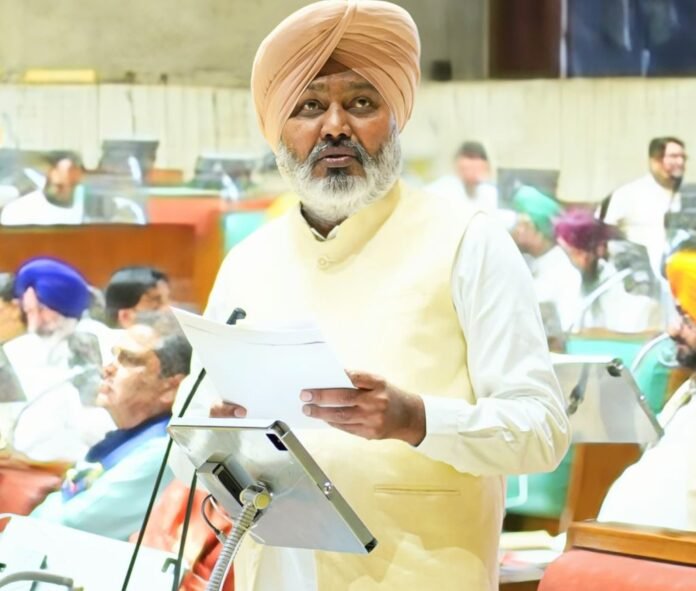In a poignant moment of historical reckoning within the Punjab Vidhan Sabha on Tuesday, July 16, 2025, Finance Minister Advocate Harpal Singh Cheema demanded the immediate recovery of a critical part of the Justice Gurnam Singh Commission report that has mysteriously gone missing from the Assembly records. The “action taken” section of this commission report—pertaining to the tragic and controversial events of February 1986 in Nakodar—has not been available for public or legislative scrutiny, raising serious concerns about transparency, accountability, and justice that have lingered for nearly four decades.
The Justice Gurnam Singh Commission was constituted to investigate a searing episode in Punjab’s history that continues to shape the state’s political and religious discourse. On February 2, 1986, five sacred Birs of Guru Granth Sahib were desecrated and burned at Gurdwara Sahib Guru Arjan Dev Ji in Nakodar. Days later, on February 4, during peaceful protests against the sacrilege, four Sikh youth—Ravinder Singh Littran, Baldhir Singh Ramgarh, Jhirmal Singh Gursiana, and Harminder Singh—were gunned down in a police firing. Despite the gravity of these incidents, no First Information Report (FIR) was filed at the time, and successive governments failed to act on the findings of the commission that was formed in the aftermath.
Speaking passionately during the debate on the Punjab Prevention of Crime Against Religious Scriptures Bill, 2025, Finance Minister Cheema connected past and present, emphasizing that true justice can only be delivered when historic injustices are acknowledged and rectified. “The truth of 1986 must be exposed—not only for historical closure but also to understand how the actions of that era resonate with what we are trying to legislate against today,” he said.
Cheema’s appeal did not fall on deaf ears. Punjab Vidhan Sabha Speaker Kultar Singh Sandhwan promptly announced the formation of a special committee to locate the missing portion of the Justice Gurnam Singh Commission report. The move was welcomed by several members of the House and seen by observers as a long-overdue step in addressing what remains a festering wound in Punjab’s collective memory.
The Finance Minister’s speech also veered into the political terrain, accusing the Shiromani Akali Dal (SAD) and allied governments of presiding over or failing to prevent desecration incidents throughout Punjab’s history. Cheema highlighted that the Nakodar incident occurred under the SAD government led by then Chief Minister Surjit Singh Barnala, with Captain Kanwaljit Singh serving as Home Minister and Sukhjinder Singh Khaira—father of current Congress MLA Sukhpal Singh Khaira—as the Education Minister. “Not a single FIR was filed, not a single individual held accountable,” Cheema lamented.
This discussion gains added gravity against the backdrop of the newly introduced Prevention of Crime Against Religious Scriptures Bill, 2025, a legislative effort aimed at enacting strict punishments for sacrilege in the state. The bill, introduced earlier this week by Chief Minister Bhagwant Singh Mann, seeks to criminalize acts of religious desecration with stringent penalties. Cheema used the Assembly floor to underline the bill’s necessity, arguing that Punjab’s spiritual sanctity has repeatedly been violated in attempts to incite unrest and political instability.
The link between the 1986 Nakodar incident and more recent cases like Bargari and Behbal Kalan was made explicit in Cheema’s address. In both cases, the pattern is disturbingly familiar—desecration followed by public outrage, peaceful protests, and disproportionate state action. These events, far from isolated, are threads in a long-running narrative of religious provocation and suppression, often occurring under politically aligned administrations.
With the formation of a committee to locate the “action taken” part of the Gurnam Singh Commission report, the Punjab Assembly now carries the responsibility of not only uncovering lost documentation but also restoring public trust. For families of the 1986 victims, for civil society, and for religious institutions, the missing report is more than a bureaucratic lapse—it is a stolen page of truth, denied to a people still living with unanswered questions.
The legacy of Nakodar is a test of Punjab’s institutional memory and political courage. If the state can now rise to the moment—with honesty, transparency, and a commitment to justice—it may yet begin to close some of its oldest and deepest wounds.
#PunjabAssembly #1986Nakodar #HarpalCheema #ReligiousScripturesBill #SacrilegePunjab #JusticeGurnamSinghReport #PunjabPolitics #PunjabHistory #SikhProtests #IndianLegislature
This is a web generated news report.




